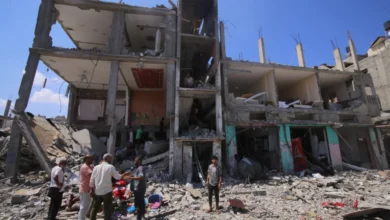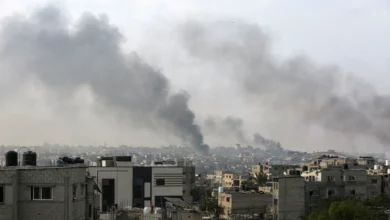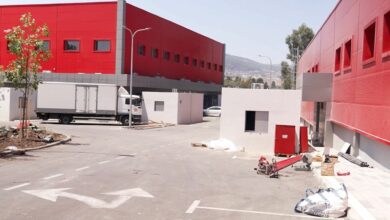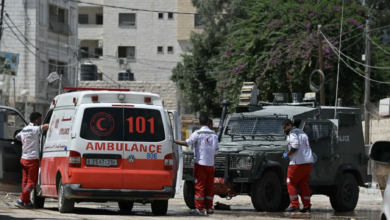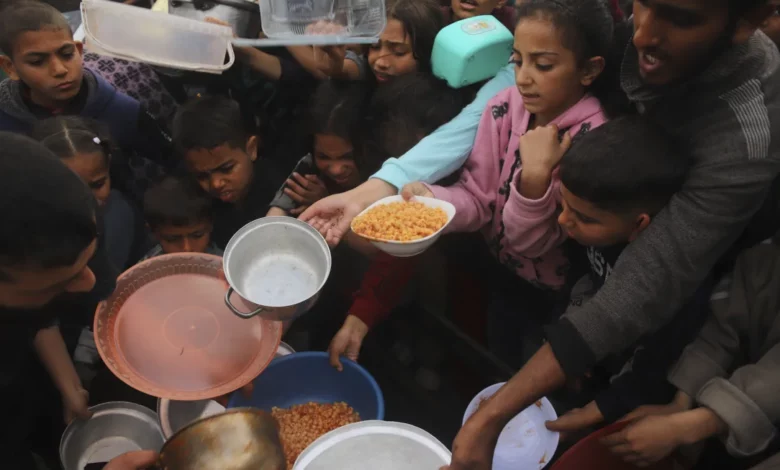
As famine looms and cases of death by starvation emerge, at least three aid providers are suspending operations in Gaza after Israeli airstrikes this week killed seven workers from World Central Kitchen (WCK), an aid group that was central to a much-touted new sea corridor from Cyprus. The killings, which included six foreign victims, caused an international uproar against Israel.
“The Israeli government needs to stop this indiscriminate killing,” WCK founder Jose Andres wrote on X after the workers were killed. “It needs to stop restricting humanitarian aid, stop killing civilians and aid workers, and stop using food as a weapon.”
Israel has taken responsibility for the killings, with Prime Minister Benjamin Netanyahu saying Tuesday that Israeli forces had “unintentionally struck innocent people in the Gaza Strip.” Imagery of three destroyed vehicles analyzed by CNN however showed that the first vehicle was 2.4 kilometers apart from the third, indicating that they were hit by separate strikes.
WCK and Anera, another aid group, have said they will pause operations in Gaza following the incident. The United Arab Emirates (UAE) is reportedly also suspending operations.
All 2.2 million people in Gaza do not have enough food to eat, with half of the population on the brink of starvation and famine projected to arrive in the north “anytime between mid-March and May,” according to the Integrated Food Security Phase Classification (IPC).
“It is a huge blow to the humanitarian operation in Gaza,” said Juliette Touma, spokesperson at the UN’s Relief and Works Agency for Palestine Refugees in the Near East (UNRWA), the principal aid agency in Gaza that has itself been sidelined by Israel.
“It’s very sad that they had to do this, although I totally understand why they did this,” she said, referring to WCK’s decision to suspend operations. Gaza, she added, is now “probably the most dangerous place in the world to be an aid worker.”
UNRWA’s convoys have previously been hit by Israeli fire, and the group has been banned by Israel from operating in Gaza’s north. The UN has urged Israeli authorities to reverse the decision.
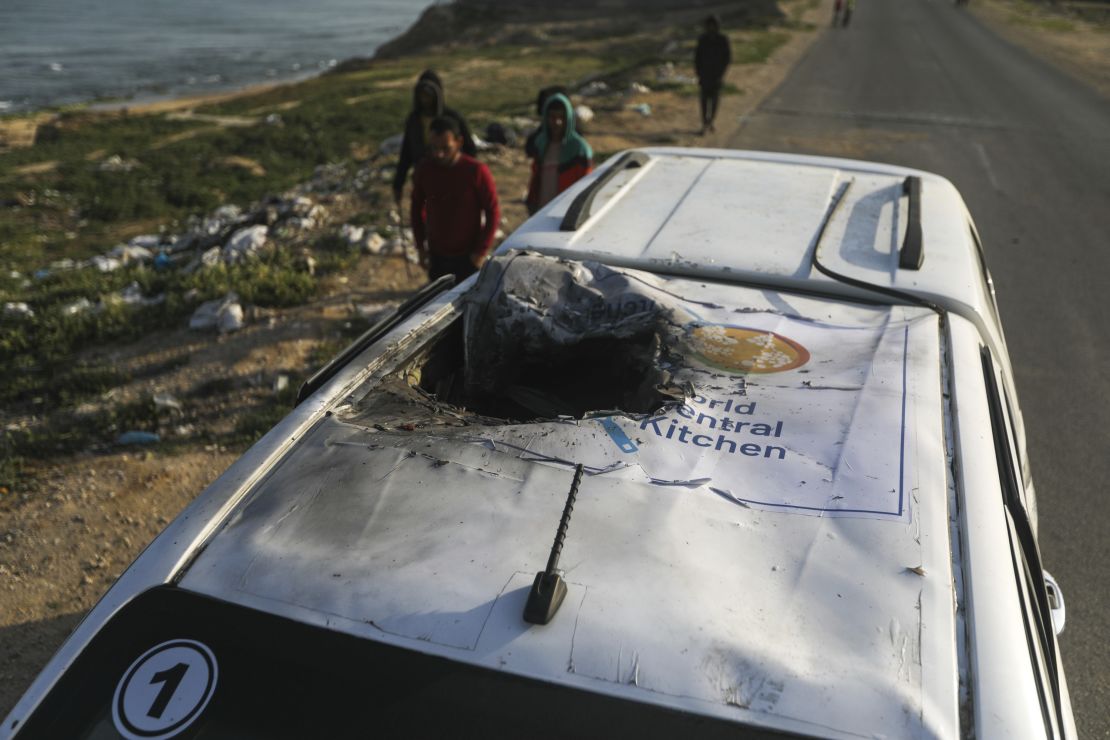
On Monday, the Cypriot foreign ministry said that a vessel organized by WCK and carrying roughly 332 tons of humanitarian aid left Gaza without offloading most of its cargo following the deadly strike on the WCK workers.
Reuters video showed the vessel arriving in the Cypriot port of Larnaca on Wednesday evening local time.
WCK on Wednesday said all of its aid ships are now back in Cyprus, adding that “a determination has not yet been made about when to resume our operations in Gaza.”
The aid group had been rising in relevance in Gaza since Israel mounted allegations that some of UNRWA’s employees were involved in the October 7 attack by Hamas. Israel has long campaigned for UNRWA to be disbanded and has not presented evidence to back its accusations against the agency’s staff. UNRWA, which has a staff of 13,000 in Gaza, said it is investigating the allegations.
WCK has been responsible for 60% of non-governmental aid deliveries, according to data released by Israel’s Coordinator of Government Activities in the Territories (COGAT), the agency that controls access to Gaza, followed by organizations such as CARE, Save the Children and ICRC. The United Nations continues to be responsible for a large majority of the overall aid that gets in.
UNRWA currently has no plans to suspend its operations in Gaza, Touma told CNN. But as its operations have been curtailed, aid deliveries coordinated by the private sector have increasingly filled the void.
WCK has been delivering nearly 20 trucks of aid through the Rafah crossing with Egypt per day. It has also delivered food from Jordan via land convoys as well as airdrops, including over 230,000 meals to northern Gaza, the area of the enclave that is most at risk of famine.
‘Famine is going to happen’
Ghassan Abu-Sittah, a British-Palestinian surgeon who worked in Gaza in the early weeks of the war, said the north of the territory will be particularly impacted with WCK’s move.
“The suspension of aid into the north by WCK means that famine, that man-made famine, is going to deepen, is going to take the lives of more children,” Abu-Sittah told CNN’s Eleni Giokos Wednesday, adding that it is also going to “alter the health of thousands of other children who we do not see.”
One of WCK’s most prominent operations was through a sea route established in March to take food from Cyprus to Gaza. That route was presented by Israel as an alternative to land corridors, where it has significantly throttled deliveries.
For comparison, each vessel carries 300 to 400 tons of aid, equivalent to 15 to 20 trucks. Gaza needs around 500 trucks of aid per day, according to agencies.
Israel maintains there is no limit on the amount of food or humanitarian aid that can enter Gaza, but aid agencies accuse it of deliberately restricting deliveries.
WCK sent nearly 435,000 meals to Gaza on the Open Arms vessel via the new maritime route last month and was preparing to send two more vessels loaded with a total of 1.2 million meals destined for the north. With Israel’s cooperation, the route was emerging as a slow but viable option to deliver aid – until the airstrike killed the WCK workers.
WCK’s kitchen and warehouse in the Gazan city of Deir al-Balah were seen shuttered on Wednesday, with banners bearing its logo still hanging on a fence.
CNN has reached out to COGAT and the Israel Defense Forces (IDF) for comment on who will be replacing WCK in Gaza.
Viability of the maritime corridor
After the attack, WCK said it was pausing operations immediately in Gaza. Shortly afterwards, American Near East Refugee Aid (Anera), an NGO that delivers aid to the West Bank, the Gaza Strip, Lebanon and Jordan, also suspended its Gaza operations.
Anera said it has provided an average of 150,000 daily meals in collaboration with WCK along with “millions of medical treatments, and thousands of critical emergency aid items” to Gaza since October 7.
The UAE is also pausing its involvement in a maritime corridor it established with international partners, CNN’s political and global affairs analyst Barak Ravid, reported on Axois.
Along with Turkey, the UAE is the biggest donor of aid to Gaza, according to COGAT, providing 25% of all aid from foreign nations. It also operates the largest field hospital in Gaza after Jordan.
The Gulf state will not resume work on the corridor until Israel assures aid workers in the enclave will be protected, Ravid reported, citing sources close to the UAE government.
CNN has reached out to the UAE government for comment.
With the UN increasingly sidelined by Israel and the WCK attack scaring off others using the maritime route, it’s unclear if the option is still feasible. The fate of the extra aid WCK had planned for Gaza is also uncertain.
Cyprus’ President Nikos Christodoulides has vowed to maintain the maritime corridor delivering aid from his country to Gaza, saying “the tragic events should not discourage us.”
Meanwhile, the main distributor of aid in Gaza, UNRWA, remains restricted from operating in some parts of the enclave, particularly in the north, where the risk of famine is the highest and cases of death by starvation have been reported. At least 176 UNRWA team members have been killed since October 7, including while in the line of duty, the UN agency said.
WCK has previously partnered with UNRWA, Touma, the UN agency’s spokeswoman, said.
At least 196 humanitarian workers have been killed in the West Bank and Gaza since October, the UN’s Humanitarian Coordinator for the Occupied Palestinian Territory, Jamie McGoldrick, said in a statement. “This is nearly three times the death toll recorded in any single conflict in a year,” he said.
CNN’s Chris Liakos, Niamh Kennedy, Vasco Cotovio, Hande Atay Alam, Allegra Goodwin, Gianluca Mezzofiore, Abeer Salman, Caitlin Stephen Hu, Muhammad Darwish, Eyad Kourdi, Jessie Yeung, Tala Alrajjal and Louis Mian contributed reporting.

